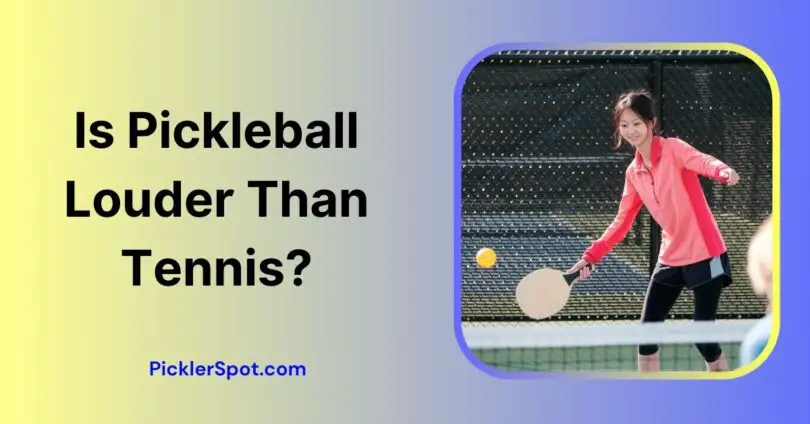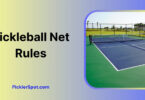With the advent of Pickleball, everyone wants to build their own private court this summer, whether indoors or outdoors, it’s quite certain that this addictive sport has everyone head over heels which doesn’t surprise me for obvious reasons as Pickleball is topping charts for its appealing dynamics.
While I love to give credit where it is due, the one question that is on everyone’s lips is “ Is Pickleball louder than tennis” certainly irks me to the point that I am compelled to curate an article on it, after all being an enthusiast, its my duty to provide guidance to my readers, with that being said, lets take a jab at this topic.
Outlining Noise Output Of Pickleball
Let’s explore the elements that may be the main culprit behind the higher noise threshold and dig into whether or not Pickleball takes the lead in terms of noise when compared to tennis.
1. Surface Type
Let’s illuminate the most pivotal aspect where pickleball takes the crown when it comes to noise output when compared to tennis. In Pickleball, you would often see the outdoor courts made with either concrete or asphalt which has extremely dense thermal mass and doesn’t really absorb the momentum of the ball when it meets the surface, allowing it to have the almost perfect level of trajectory.
Henceforth, this is why you would often hear a “clack” sound when smashing the ball with a perfect drive, unlike in tennis, where the court is made with wooden floor or is simply covered with a carpet to provide traction for the shoes and assist the ball in its trajectory.
Nevertheless, if both of the sessions of these two contrasting games are being held side by side, you would notice an apparent difference in terms of noise output where pickleball is the loudest among them.
2. Ball Sound Output
The ball used in a game of tennis is made from rubberized material with felt covering its surface, it is pressurized to ensure it has a tactical bounce rate, however, once it hits the surface, you can barely hear the sound unless and until it is hit with quite a significant force.
In Pickleball, however, things are a bit different, you will notice that the ball is made from synthetic plastic which has a hollow structure, allowing air to propagate through it since it has tons of holes across its structure. While pickleball has have slower traversal speed in general, it certainly produces a higher threshold of noise.
The noise threshold exponentially increases once the session is played out in indoor settings where the waves of sound don’t really have space to propagate elsewhere, creating an echo-like effect.
Lower Net Placement
This might sound trivial but the net placement of Pickleball and tennis certainly plays a huge role in creating higher noise output. For starters, a Pickleball net is placed at 34 inches in the middle region of the court while remaining at 36 inches in the center post.
In tennis, the net is placed 36 inches higher while being raised at a whopping 42 inches at the center post, which is around 3.6 feet, which implies players are required to execute more footwork, allowing the soles of their shoes to be more squeaky that is almost as noisy as a basketball court.
Paddle’s Dilemma
On the other hand, in Pickleball, players are supposed to use a paddle that is either made from wood, graphite, or carbon fiber material, all of which boasts a hard surface covered with rubberized lining which doesn’t do much to dampen the sound of the ball, so it’s pretty obvious that even the faintest of Dinks could be audible at least to the surrounding areas.
Tennis, even though offers a much more robust form of gameplay with a more aggressive approach, uses a racquet with strings in contrast to a pickleball paddle that has a harder surface.
Nevertheless, the tensile strength of the strings allows the force of the ball to absorb momentum producing little to no sound which is barely audible by the person that is standing right beside the court.
So Which One Is Louder?
To give you a precise answer, when keeping the elements mentioned above in mind, Pickleball tops the charts when it comes to noise threshold ratio, in fact even in the most casual settings, the game itself produces a whooping 70-75 decibel noise.
The noise problem is considerably higher when playing the session in peak competitive settings where you would hear the moans of a player, the sound of equipment used, and the constant footwork which takes a toll on the noise threshold, almost reaching upwards of 80 decibels.
Surprisingly enough, a game of tennis when played in normal settings during recreational playstyle barely hits the mark of 65 decibels, which is quite weird considering how aggressive the game can get.
Speaking of aggressive, tennis when played in a competitive format, produces a noise ratio of up to 70 decibels, making it on par with Pickleball sessions when it’s played in recreational settings.
Keep in mind, that these noise settings are only assessed based on the values provided by a team holding a single player, if a game is expanded to a duos format, expect a 10-decibel increase as a general rule of thumb.
It must also be kept in mind that indoor scenarios could also exponentially increase the noise output but that is currently a subjective matter because there are some private indoor courts that ensures the echo effect is minimized, nevertheless, when compared to an outdoor court, the noise threshold is way higher.
And That’s A Wrap
It’s perfectly understandable when things get heated in the court, nobody is conscious enough to keep track of the noise ratio that your session is outputting, however, just because you aren’t concerned doesn’t mean you should totally ignore it as it goes against the spirit of the sports.
As for the question Is pickleball louder than tennis, well, the short answer is, Yes, Pickleball its core really exceeds the noise threshold, when compared to tennis, however, the difference is negligible enough to be considered on par.
Be a law-abiding social gentleman and make sure you are mindful of all the nuisance that is caused to your surroundings, a general rule of thumb is to never do something that you won’t like to be done to yourself, this will allow you to manage your noise output to greater levels.
Good Luck 👍.









